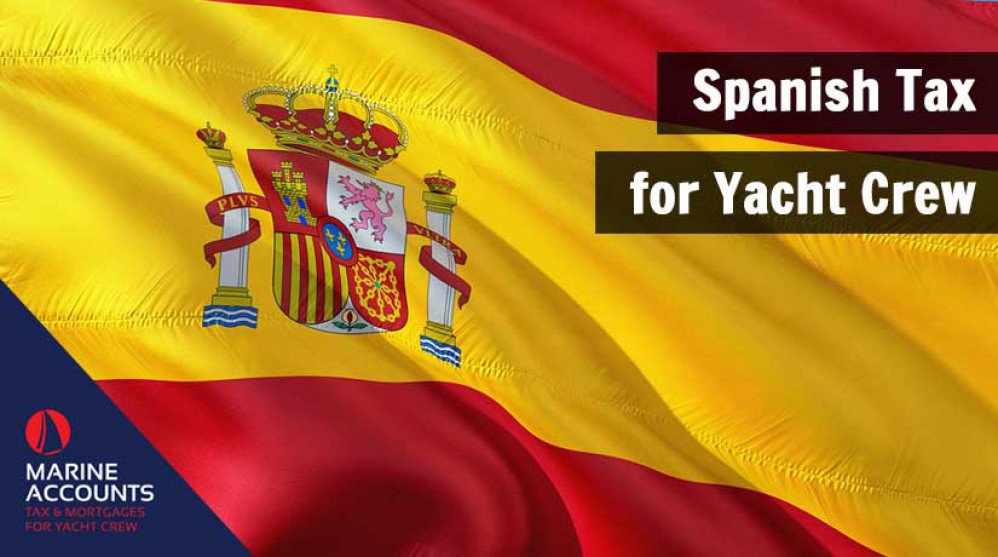Spanish Tax for Yacht Crew
- Authors
-
-

- Name
- Patrick Maflin
-

Image source: https://pixabay.com/photos/international-flag-eu-europe-2681322/
If you work on a yacht that is based in Spain you maybe liable to pay tax on your income and this will need to be declared in a tax return.
If you are not a Spanish resident then you have the option to only pay tax on income derived in Spain.
However those who are resident will owe tax on their worldwide income as well.
If you are unsure of your residency status, please take the test using the link below:
Take Our Online Residency Text
Here's a list of important areas of Spanish taxation you need to be aware of. Simply click a link below to be taken straight to the relevant section:
- Spanish Tax Authority
- Registering for Tax in Spain
- Resident Tax Returns
- Declaring Foreign Assets
- Non-Resident Tax Returns
- Double Taxation Agreements
- Taxation Rates in 2018 (for income earned in 2017)
- Tax Deductions
1. Spanish Tax Authority
The Spanish tax authority is called the Agencia Tributaria.
Tax is calculated on a progressive scale for Spanish residents and deductions can be applied.
Non-residents only pay tax on Spanish sourced income, which is often taxed at a flat rate.
The Spanish tax year is based on the calendar year and runs from 1st January – 31st December.
Spain has 17 regions each setting their own tax rates and liabilities.

Image source: https://nov.wikipedia.org/wiki/Autonomi_komunie#/media/File:Autonomous_communities_of_Spain.svg
2. Registering for Tax in Spain
If you wish to start paying tax in Spain you will need to obtain an NIE number.
You can obtain one of these from the Local Foreigner’s Office (Oficina de Extranjeros) or Police Station.
A Modelo 30 must also be completed to register your obligation to pay Spanish tax.
3. Resident Tax Returns
Spanish residents are required to submit an annual tax return if they meet one or more of the below items:
- 1. Annual income from employment is greater than EUR 22,000;
- 2. Self-employed or run your own business;
- 3. Receive rental income greater than EUR 1,000 a year;
- 4. Capital gains and savings income of more than EUR 1,600 a year;
- 5. Your first year declaring tax residency in Spain.

4. Declaring Foreign Assets
You are required by law to declare all foreign assets/holdings in excess of €50,000, in Modelo 720 form.
5. Non-Resident Tax Returns
If you are a non-resident of Spain, but have Spanish sourced income such as rent.
This needs to be declared in an annual tax return and will be taxed at a flat rate.
6. Double Taxation Agreements
Spain is part of the OECD and has Double Taxation Agreements with all members.
Double Taxation Agreements are put in place to ensure that you will not be taxed in two jurisdictions at the same time.
7. Taxation Rates in 2018 (for income earned in 2017)
Spanish taxation rates are not uniform and change depending on the region. Below is a list of average Spanish tax rates:
- Up to EUR 12,450: 19%
- EUR 12,450–20,200: 24%
- EUR 20,200–35,200: 30%
- EUR 35,200–60,000: 37%
- More than EUR 60,000: 45%
- Autonomo (Self Employed)
Depending on the type of yacht you work on, whether it is Spanish Flag or Foreign Flag, you may need to register under Autonomo.
Below is a breakdown of how taxation rates work under this scheme:
- VAT (IVA) is charged from day one of trading at 21% to all EU Clients
- IRPF (Income Tax) is charged at 15% to B2B or 20% B2C Clients
- Social Security; 1st Year €50 per month, 2nd Year €138 per month & 3rd Year €193 per month.
8. Tax Deductions
Spanish residents are granted a basic personal allowance, which is set at EUR 5,550, or EUR 6,700 from age 65 and EUR 8,100 from age 75.
Those who have children under 25 living with them, earning an income of less than EUR 8,000, can claim an additional allowance of:
- EUR 2,400 for the first child
- EUR 2,700 for the second
- EUR 4,000 for the third
- EUR 4,500 for the fourth
- Additional allowance of EUR 2,800 for each child under three years.
If you have a parent or grandparent living with you, with an income of less than EUR 8,000, you can claim an allowance of EUR 1,150 if they are over 65 and EUR 2,550 if they are over 75.
In general, you can claim tax deductions in Spain for:
- Payments into the Spanish social security system
- Pension contributions
- First EUR 1,500 of dividend interest
- Costs of buying and renovating your main home
- Charitable donations.
If you require additional advice on any of the points raised, please click on the link below to contact a member of the team:
Click for Professional Tax Advice Whilst Working on a Yacht Based in Spain
Liked this article? Try reading: Yacht Crew Tax & Financial Information - Your Ultimate Guide
Any advice in this publication is not intended or written by Marine Accounts to be used by a client or entity for the purpose of (i) avoiding penalties that may be imposed on any taxpayer or (ii) promoting, marketing or recommending to another party matters herein.


